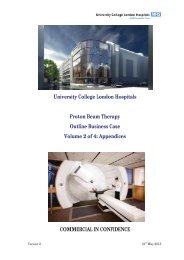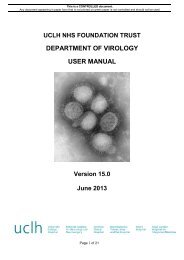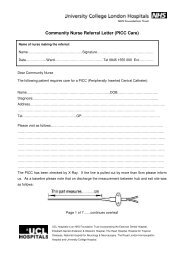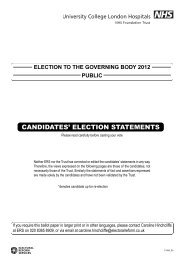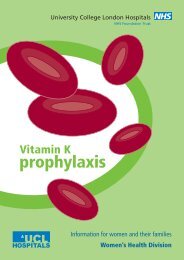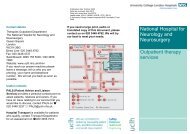Miscarriage - University College London Hospitals
Miscarriage - University College London Hospitals
Miscarriage - University College London Hospitals
Create successful ePaper yourself
Turn your PDF publications into a flip-book with our unique Google optimized e-Paper software.
<strong>University</strong> <strong>College</strong> Hospital<br />
<strong>Miscarriage</strong><br />
Women’s Health
2<br />
Introduction<br />
The purpose of this leafl et is to:<br />
• Describe what a miscarriage is and why it happens<br />
• What it means for your health<br />
• What treatment options are available<br />
• Discuss future fertility and the risk of miscarriage occurring again<br />
What is miscarriage?<br />
A miscarriage is the spontaneous loss of a pregnancy between<br />
conception and 24 weeks into pregnancy. Most miscarriages occur<br />
very early in pregnancy (before 12 weeks). It is estimated that nearly<br />
half of all pregnancies end in miscarriage. The majority of these<br />
losses occur before a period is missed and therefore women often do<br />
not realise that a miscarriage has occurred. Once the menstrual<br />
period is missed and the urine pregnancy test becomes positive, only<br />
one in six pregnancies will miscarry. In general, the risk of<br />
miscarriage decreases as the pregnancy progresses further.<br />
What are the symptoms of miscarriage?<br />
Symptoms of miscarriage vary from one woman to another. The most<br />
common symptom is vaginal bleeding. This is usually accompanied<br />
by period-like pains. Some women will have no bleeding or pain and<br />
the only symptoms they experience are the loss of pregnancy<br />
symptoms such as nausea or breast tenderness. Some women may<br />
not experience any symptoms at all and may be diagnosed as having<br />
a miscarriage at a routine ultrasound scan.<br />
Bleeding and pain are not always associated with a miscarriage as<br />
many women with normal pregnancies may also experience these<br />
symptoms.
3<br />
Why do miscarriages happen?<br />
Most miscarriages are caused by a fault on a chromosome (a<br />
package of genes) within the cells of the developing pregnancy. This<br />
means that the pregnancy is not healthy and is not developing<br />
normally. This cannot be prevented nor is it caused by anything you<br />
have done during the pregnancy.<br />
The risk of faults occurring on chromosomes increases with the<br />
mother’s age, so miscarriage is more likely to occur in older women.<br />
The risk of miscarriage increases from about ten percent for a 20<br />
year old women to approximately 40 percent at the age of 40.<br />
Very rarely a miscarriage can happen because the uterus (the womb)<br />
is not the normal shape or because the mother’s immune system<br />
rejects the pregnancy. Because these problems are so rare, we<br />
would normally only search for them in women who have<br />
experienced three or more miscarriages in a row. There is no<br />
evidence that early miscarriages are caused by any infections.
4<br />
Types of miscarriage<br />
There are three different types of miscarriage:<br />
1. Early embryonic demise is when the pregnancy has stopped<br />
developing but it remains intact within the uterus.<br />
2. Incomplete miscarriage is when some of the pregnancy tissue has<br />
already been passed but some tissue is still left inside the uterus.<br />
3. Complete miscarriage is when all of the pregnancy has been<br />
passed and the uterus is empty.<br />
Diagnosing a miscarriage<br />
The most accurate method to diagnose a miscarriage is an internal<br />
(transvaginal) ultrasound scan. This type of scan can detect subtle<br />
changes inside the uterus, and gives a more accurate way of telling<br />
between normal pregnancies and miscarriages. In some women it<br />
may not be possible to diagnose a miscarriage during the fi rst scan<br />
and the examination needs to be repeated a week later.<br />
Another way to identify a miscarriage is by measuring the level of<br />
pregnancy hormones. This may help to tell between normal early<br />
pregnancies and miscarriages. Generally, if the hormone levels are<br />
low the risk of miscarriage is increased.<br />
Management of miscarriage<br />
The way we treat and manage miscarriage largely depends on the<br />
severity of the symptoms. If you experience severe pain or very<br />
heavy bleeding you may need to be admitted to the hospital straight<br />
away. However, if the symptoms of miscarriage are mild you will be<br />
offered a choice of different management options.
5<br />
1. Expectant management<br />
This means waiting for the miscarriage to happen naturally. We<br />
normally recommend this option when an incomplete miscarriage<br />
has been diagnosed. This method is successful for about 80 percent<br />
of women with incomplete miscarriages.<br />
If you take this option, you may bleed for up to two weeks. During this<br />
time you may experience some heavy bleeding with clots and periodlike<br />
pains. You may need to take painkillers (such as Paracetamol or<br />
Ibuprofen).<br />
If you’re bleeding does not settle you should return to the Early<br />
Pregnancy Unit for a repeat scan to check whether there is any<br />
pregnancy tissue left inside your uterus. If your uterus is empty, a<br />
complete miscarriage is diagnosed and no further treatment is<br />
needed.<br />
If there is some pregnancy tissue left, then you may be offered a<br />
surgical procedure called an Evacuation of Retained Products of<br />
Conception (ERPC). Alternatively you may continue to wait for the<br />
remaining pregnancy tissue to pass naturally.<br />
Risks associated with expectant management<br />
• Heavy bleeding – Bleeding occurs in every miscarriage. The<br />
amount of bleeding may vary. It is unusual for women to experience<br />
very heavy bleeding. Generally if you need more than one sanitary<br />
towel per hour you may be losing too much blood.<br />
• Abdominal pain – Minor lower abdominal cramping is common.<br />
Pain killers such as Paracetamol or ibuprofen may help. Severe<br />
lower abdominal pain or tenderness that is not relieved by<br />
painkillers is unusual.
6<br />
• Infection – Symptoms that might indicate infection include fever or<br />
shivering, vaginal discharge which smells foul or looks infected,<br />
abdominal pain or tenderness which is persistent and not relieved<br />
by painkillers.<br />
If you experience any of the heavy bleeding, severe lower<br />
abdominal pain or tenderness that is not relieved by painkillers,<br />
infection (all as described above) go to the Early Pregnancy Unit<br />
immediately. If this occurs out of clinic hours (09:00 till 17:00<br />
Monday to Friday) then please go to the nearest Accident and<br />
Emergency Department.<br />
• Prolonged follow up – Although most miscarriages are completed<br />
within a week from the diagnosis, sometimes it may take much<br />
longer for the pregnancy tissue to be expelled from the uterus.
7<br />
2. Surgical Treatment – Evacuation of retained products of<br />
conception<br />
This involves emptying the uterus using vacuum suction. We<br />
recommend this treatment when an early embryonic demise has<br />
been diagnosed. This is because it can take a long time for this type<br />
of miscarriage to be passed out of the uterus spontaneously. Also, if<br />
the pregnancy loss occurs later in pregnancy, bleeding and pain may<br />
be severe requiring emergency surgery.<br />
Evacuation of retained products of conception is usually performed a<br />
few days after diagnosis in the Day Surgery Centre or in our<br />
Outpatient Clinic. However, if you are bleeding heavily or if you are in<br />
pain, you will be admitted to the gynaecology ward.<br />
The procedure can be carried out under local anaesthetic in the<br />
clinic, or under general anaesthetic in an operating theatre.<br />
The procedure under local anaesthetic is mainly suitable for women<br />
with early miscarriages who have previously had vaginal deliveries. If<br />
you are interested in having the procedure under local anaesthesia,<br />
please ask the nurses to provide you with additional information. In<br />
either case the pregnancy is removed through the vagina so there<br />
are no cuts made on the abdomen (stomach) and there are no<br />
stitches.<br />
Following the operation you are likely to experience some light<br />
vaginal bleeding for up to ten days. The Evacuation of retained<br />
products of conception can be carried out up to seven days after the<br />
scan. There is a possibility that while you are waiting for an<br />
Evacuation of retained products of conception you may miscarry<br />
naturally. If you experience heavy bleeding you should come back to<br />
the Early Pregnancy Unit the next day for another scan to check<br />
whether the operation is still needed. It is advisable that you<br />
telephone the Unit fi rst (number at the back of booklet).
8<br />
If the pain or bleeding is causing distress you should return to the<br />
Early Pregnancy Unit immediately. If this occurs out of clinic hours<br />
(09:00 till 17:00 Monday to Friday) then please go to the Accident<br />
and Emergency Department at the <strong>University</strong> <strong>College</strong> <strong>London</strong><br />
Hospital.<br />
Procedure Advantages Disadvantages<br />
ERPC carried out<br />
under general<br />
anaesthetic<br />
ERPC carried<br />
out under local<br />
anaesthetic<br />
• Painless<br />
• Fast recovery<br />
• Avoidance of risks<br />
associated with<br />
general anaesthesia<br />
• Admission to<br />
hospital<br />
• Risk of anaesthetic<br />
complications<br />
• Longer recovery<br />
• Some women<br />
experience<br />
discomfort during<br />
surgery<br />
Risks of surgical management<br />
These problems are rare but they will be discussed in more detail<br />
when the operation is explained to you. Risks can include:<br />
• Bleeding – If you bleed very heavily during the operation you may<br />
need a blood transfusion. This is rare and would only happen if the<br />
doctors felt it is absolutely necessary. If you object to receiving<br />
blood products please tell us before you sign a consent form.<br />
• Infection – All surgical procedures carry a risk of infection. If you<br />
develop a fever, unusual vaginal discharge or persistent abdominal<br />
pain, please come back to the Unit or visit your GP as soon as<br />
possible. If this happens, we will take vaginal swabs and give you a<br />
course of antibiotics.
9<br />
• Uterine perforation – This is a very rare complication. During the<br />
operation it is possible for the surgeon to accidentally make a small<br />
hole in the uterus. In this situation he or she may need to make a<br />
small cut on the abdomen and insert a telescope (laparoscopy) in<br />
order to check whether there is bleeding, and if necessary, repair<br />
the hole. In exceptional circumstances it might be necessary to<br />
proceed to an open operation (laparotomy). You would also be<br />
given antibiotics to prevent infection.<br />
• Incomplete removal of pregnancy – Occasionally, small amounts<br />
of pregnancy tissue can be left inside the uterus after the<br />
procedure. If you experience prolonged or heavy bleeding following<br />
surgery and/or pain please go to the unit for a repeat scan. If tissue<br />
is left behind it may be necessary to repeat the procedure.<br />
We must by law obtain your written consent to any operation and<br />
some other procedures beforehand. Staff will explain all the risks,<br />
benefi ts and alternatives before they ask you to sign a consent form.<br />
If you are unsure about any aspect of the treatment proposed, please<br />
do not hesitate to ask to speak with a senior member of staff again.<br />
Follow up after miscarriage<br />
During the fi rst two weeks following a miscarriage you should avoid<br />
having sex or using tampons to reduce the risk of infection. If you<br />
continue to bleed or experience pain for more than a week, you<br />
should go back to the early pregnancy unit or your GP.<br />
It can take up to four weeks following a miscarriage for your<br />
pregnancy hormones to clear, during which time a pregnancy test<br />
can still read positive. Your next menstrual period may also be<br />
delayed for two to three weeks.
10<br />
Blood group<br />
Some women will have a blood type called Rhesus negative. If your<br />
blood group is Rhesus negative and you have miscarried later than<br />
12 weeks gestation, you will need an injection called Anti-D. This<br />
helps to prevent antibodies developing against foetal blood cells,<br />
which could reduce your chance of having a healthy pregnancy in the<br />
future. The injection is also offered to all Rhesus negative women<br />
who have surgery to remove pregnancy tissue from the uterus.<br />
Other appointments<br />
If you already have antenatal and/or midwife appointments booked<br />
for the pregnancy, please inform the nurse who is dealing with you.<br />
The relevant departments will then be notified
11<br />
Emotional support<br />
Women and their partners can have different emotional reactions to<br />
miscarriage. Grieving and depression are common reactions to<br />
losing a pregnancy and it can take time for these to resolve. If these<br />
feelings are prolonged or if you feel that you need help in coming to<br />
terms with the loss of your pregnancy, it can help to talk to a<br />
professional.<br />
Trying again<br />
If you would like to try for another pregnancy we advise that you wait<br />
for your next normal period. This makes it easier to fi nd out the due<br />
date of the pregnancy. If you get pregnant before the fi rst period this<br />
should not increase the risk of miscarriage.<br />
Some women may need a little more time to recover emotionally and<br />
physically from the miscarriage. The best time to start again is when<br />
you and your partner feel ready to do so. There are several things<br />
you can do to increase your<br />
chance of having a healthy<br />
pregnancy:<br />
• Take folic acid supplements<br />
• Reduce alcohol and caffeine<br />
intake<br />
• Stop smoking<br />
• Eat a healthy, balanced diet
12<br />
Further help<br />
The Ectopic Pregnancy Trust<br />
Telephone: 01895 238025<br />
Website: www.ectopic.org<br />
The <strong>Miscarriage</strong> Association<br />
(Leaflets available in the unit)<br />
Telephone: 01924 200799<br />
Website: www.miscarriageassociation.org.uk<br />
SANDS<br />
(Stillbirth, miscarriage and Neonatal death support)<br />
Telephone: 020 7436 5881<br />
Babyloss<br />
(Website for miscarriage)<br />
www.Babyloss.com<br />
There are also books which can be helpful:<br />
<strong>Miscarriage</strong>: Women’s Experiences and Needs By Christine Moulder<br />
Published by Pandora Press<br />
PALS<br />
The Patient Advice and Liaison Service (PALS) is a service that<br />
offers support, information and assistance to patients, relatives and<br />
visitors. The PALS offi ce is located on Ground Floor Atrium,<br />
Telephone: 020 3447 9975<br />
Email: PALS@uclh.nhs.uk<br />
Address: PALS, Ground Floor Atrium, <strong>University</strong> <strong>College</strong><br />
Hospital, 235 Euston Road, <strong>London</strong> NW1 2BU
13<br />
How to contact us<br />
Should you have any questions please contact the staff in our Early<br />
Pregnancy Unit:<br />
• General Early Pregnancy Unit enquiries 020 3447 9411<br />
• Senior Nurse 08451555000 ext 76515 (voicemail) or 020 3447<br />
6515 (voicemail)<br />
Early Pregnancy Unit opening times:<br />
Mondays to Friday 09:00 till 12:30 and 14:00 till 16:30<br />
Saturday and Sunday 09:00 till 12:00 (Accident and Emergency<br />
referrals only)<br />
For advice out of hours you may contact NHS Direct on 0845 4647.<br />
For emergencies after hours please attend your nearest Accident<br />
and Emergency department.<br />
Address: The Gynaecological Diagnostic<br />
and Outpatient Treatment Unit<br />
Clinic 3, Lower Ground Floor<br />
Elizabeth Garrett Anderson Wing<br />
<strong>University</strong> <strong>College</strong> Hospital<br />
235 Euston Road,<br />
<strong>London</strong>, NW1 2BU
14<br />
If you need a large print, audio or translated copy of the<br />
document, please contact us on 020 3447 9411. We will try<br />
our best to meet your needs.<br />
Turkish<br />
Bengali<br />
Cantonese<br />
Polish<br />
Russian<br />
Mandarin
First published: April 2009<br />
Last review date: August 2013<br />
Next review date: August 2015<br />
Leaflet code:<br />
UCLH/SH/WH/GYNAE/MISCARRIAGE/02<br />
© <strong>University</strong> <strong>College</strong> <strong>London</strong> <strong>Hospitals</strong> NHS Foundation Trust<br />
Created by Medical Illustration RNTNEH 020 3456 5103 Unique Code: 28275



